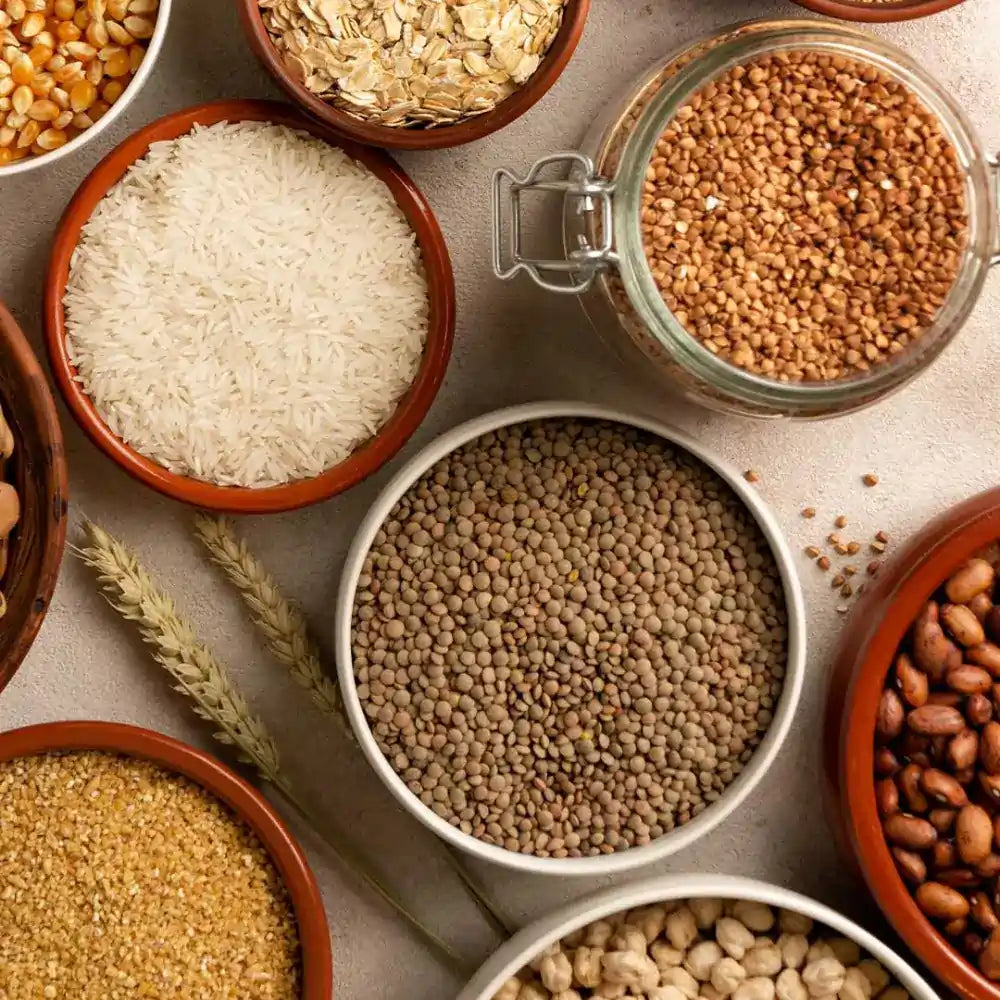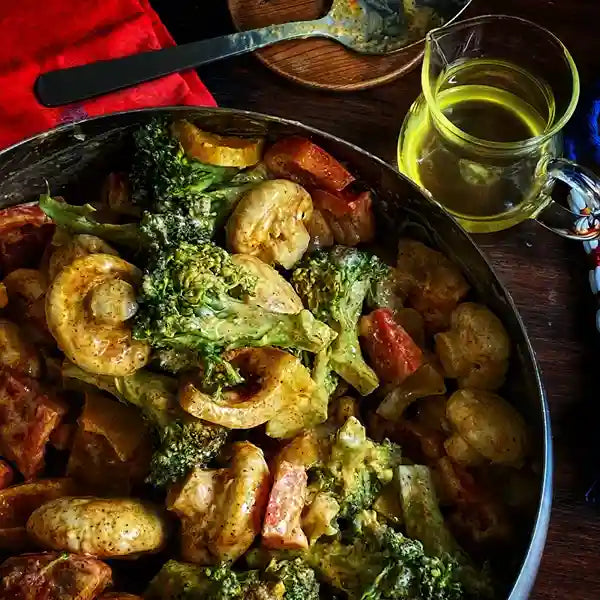Breakfast is an important meal.
But, for those dealing with diabetes, figuring out what to eat for the "most important meal of the day" can be pretty puzzling.
When you have diabetes, keeping your blood sugar levels in check means keeping an eye on your carb intake. But many common breakfast choices like cereals, flavored yoghurt, and fruit juice are packed with refined sugar, and unhealthy fats—things that we're advised to avoid to keep diabetes at bay.
So, what is the best breakfast for a diabetic to eat?
Breakfast for diabetic patients doesn’t need to be very elaborate. It can be something as simple as a whole grain toast with peanut butter. Preferably, you should also opt for foods that are high in protein and fiber, include good fats, and have lower to moderate levels of carbohydrates.
In this blog, we will help you understand why a healthy breakfast for diabetics is important and also provide some diabetes-friendly breakfast ideas to kickstart your day on the right track.
Let’s get started.
Did you know?
Research has claimed that individuals with diabetes who have breakfast every morning are less prone to overeating later in the day.
The Significance of Breakfast for Managing Diabetes
Before we go into the details of healthy breakfast options for diabetics, let us first understand why eating a nutritious breakfast is crucial for people dealing with diabetes.
Here's why:
A nutritious breakfast helps regulate blood sugar. For instance, it prevents a sudden rise in blood sugar after fasting overnight, which can lead to high sugar levels throughout the day.
Having a balanced breakfast with the right amount of protein can manage hunger and cravings, thus, preventing overeating.
It may also help lower the risk of insulin resistance.
Lastly, breakfast boosts energy levels, aiding in daily activities and physical exercise.
Now that we know why breakfast matters for diabetics, let's hop onto some healthy breakfast choices.
Wholesome Breakfast Ideas for Diabetics
A healthy and nutritious breakfast for diabetic patients doesn’t necessarily have to be an elaborate one. It can be something very simple and easy to make yet be loaded with nutrients.
So, what can diabetics eat for breakfast?
Here are 5 food options that can be great for breakfast.
1. Ragi or Finger Millet Porridge
Made by simmering ragi flour with water or milk, Ragi or Finger Millet Porridge thickens into a creamy consistency, providing you with the morning energy you need.
The nutritional composition of Ragi or Finger Millet Porridge per 100g includes:
Carbohydrates: Around 72.6 gms
Protein: Approximately 7.7 gms
Crude Fiber: Around 3.6 gms
Having porridge in the morning is a wonderful way to kickstart your day.
Here is why-:
- It's gentle on your stomach and keeps you feeling satisfied until your next meal.
- Ragi is an excellent option for individuals managing diabetes because it's rich in dietary fiber, minerals, and amino acids, which can help regulate blood sugar levels.
Other dishes like ragi dosa, Ragi upma, ragi uttapam, ragi idli, and more, are ideal choices for a diabetic-friendly breakfast.
Pro tip: You can add natural sweeteners like jaggery or honey for a healthy and satisfying start to your day
Note: you can easily make Ragi flour at home by just sundrying Ragi millets for a few hours. You can then roast them and powder them in a blender.
Moving to another nutritious gluten-free option - Bajra Poha.
2. Bajra Poha
It's rare to come across an Indian who isn't familiar with Poha or flattened rice. Many families start their mornings with this traditional breakfast every day.
For those managing diabetes, choosing Bajra Poha over the regular version is a smart move.
The nutritional composition of Bajra Poha includes:
Protein: Approximately 6 gms
Fat: Around 1.7 gms
Fiber: Around 2 gms
Vitamins and minerals: Such as iron, magnesium, and phosphorus, are essential for various bodily functions.
Bajra poha is made by soaking and stir-frying Bajra flakes along with spices, vegetables, and optionally peanuts.
- It is packed with more nutrients like iron, fiber, and proteins.
- It's easy on the stomach, gluten-free, and has a low GI rating, as compared to rice, which helps in managing blood glucose levels.
By adding this traditional diabetic-friendly breakfast to your routine, you can indulge your taste buds while also keeping your sugar levels in check. In addition to Bajra poha, Ragi poha can also be a good option to include.
Let's spice things up with oatmeal, a delightful addition to your diabetic-friendly breakfast lineup.
3. Oatmeal
Oatmeal has become a popular and effective addition to the list of breakfast options for diabetics. Just like ragi porridge, oatmeal requires no preparation as such. Just soak your oats in water and milk until they turn thick and creamy.
The nutritional composition of oatmeal includes:
Protein: Around 10.7 gms
Fat: Around 5.3 gms
Fiber: Approximately 8.1 gms
It is a wholesome breakfast meal for the following reasons:
- The fiber in oats helps you feel fuller for longer, potentially reducing hunger cravings and managing diabetes better.
- Oatmeal helps regulate insulin production and controls blood glucose levels by promoting slow sugar absorption into the bloodstream.
Pro Tip: You could also add some freshly cut fruits into your bowl.
Dishes such as oatmeal mix, oatmeal cakes, savoury oatmeal, and steel-cut oatmeal are wonderful breakfast options.
Now, let's switch gears and savour the simplicity of multigrain toast with peanut butter.
4. Multigrain Toast with Peanut Butter
A simple breakfast choice for people with diabetes is a slice of multigrain toast topped with nut butter. It is made by toasting slices of multigrain bread and spreading them with peanut butter or another desired spread. However, using peanut butter enhances its nutritional benefits.
The nutritional composition of peanut butter includes:
Carbohydrates: 22.3 gms
Protein: Around 22.5 gms
Fat: Roughly 10.1 gms
Fiber: Around 4.8 gms
Vitamins and minerals: Including vitamin E, magnesium, and phosphorus.
You can opt for this option for the following reasons:
- The healthy fats in peanut butter can help slow down the absorption of sugar into the bloodstream, preventing sudden spikes in blood sugar levels.
- Peanut butter is also a great source of natural protein and is an energy-boosting food.
- Combining toast and butter provides a good balance of daily nutrition.
Now, let's explore another wholesome choice: Moong Dal Parantha.
5. Moong Dal Parantha
Parathas hold a cherished spot in the hearts of many Indians. For those managing diabetes, trying out a variation like moong dal parathas can be a healthier option compared to traditional aloo parathas.
- These parathas can help regulate insulin levels due to their lower glycemic index compared to aloo parathas.
- The combination of moong dal's protein and fiber content helps slow down the absorption of sugar into the bloodstream, preventing spikes in blood sugar levels.
The nutritional composition of moong dal paratha includes:
Calories: Approximately 339 kcal
Carbohydrates: Around 58.4 gms.
Protein: Roughly 25 gms
Fat: Approximately 1.34 gms
Fiber: 27.7 gms
Vitamins and minerals: Iron, magnesium, and B vitamins from moong dal and whole wheat flour.
You can prepare Moong dal paratha for breakfast by soaking moong dal for 4-5 hours and cooking it until tender. You can then mix the dal with a well-prepared dough. Then, divide the dough, roll out flatbreads, stuff with filling, and cook on a hot tawa until golden brown.
Getting off to a good start each day holds immense importance, particularly for individuals managing diabetes. If you're keeping an eye on your blood sugar and carbohydrate intake, it's wise to avoid sugary, packaged, fruit-filled, or flavored breakfast options.
Here are some helpful tips to assist you in making better choices.
A Diabetes-Friendly Breakfast: Practical Tips
What you choose to eat depends upon your individual meal plan, what foods you like, food preferences, health goals, daily schedule, and budget.
However, here are some tips that you can keep in mind:
1. Watch your carb intake
The number of carbs you consume during breakfast will vary depending on your own eating plan and how your body reacts to carbs in the morning. Many breakfast options are carb-heavy, so it's crucial to be mindful of the carb content in your morning meal.
Cereals, milk, and fruit are all carb sources that can easily accumulate when eaten together.
2. Cut back on processed grains and sugars
Reducing processed grains and sugars is key for a healthier breakfast. Opt for cereals low in added sugars and high in fiber, or choose oatmeal topped with fresh fruits or nuts to manage blood sugar levels and support overall health.
3. Opt for healthy fats
Opt for good fats. Fats can keep you feeling satisfied, but it's important to make smart choices. Foods like bacon, sausage, and eggs cooked in butter are packed with unhealthy fats, which can increase your chances of heart issues. Instead, try incorporating peanut oil or A2 Ghee in your meals as a healthier option.
4. Make sure to add lean protein and fiber
One of the key aims of breakfast is to keep you satisfied until lunch. Protein and fiber take their time to digest, curbing those hunger pangs and keeping you feeling satiated for longer.
FAQs: Balanced and Diabetes-Safe: 5 Breakfast Options For Positive Morning
Why is it important for a person suffering from diabetes to balance their carbohydrate intake?
Consuming more carbohydrates than usual can lead to elevated blood glucose levels, while consuming less can potentially cause hypoglycemia, or low blood glucose levels. Therefore it is important to have a balanced amount of carbohydrates.
At what hour should individuals with diabetes consume breakfast?
It's recommended they have it within one to two hours of waking up in the morning.
How many eggs can someone with type 2 diabetes have for breakfast?
Eggs are unlikely to cause a spike in blood sugar levels. Research from 2018 suggests that individuals with diabetes who lead a healthy lifestyle can safely consume up to 7 eggs per week.
Conclusion
Regardless of whether you have diabetes or not, having a nutritious breakfast is crucial for gearing you up for a productive day. Opting for an unhealthy breakfast or skipping it altogether can leave you feeling dizzy and low in energy.
And if you're managing diabetes, it's important to stay clear of breakfasts loaded with refined carbs or added sugars while lacking in essential nutrients.
When planning meals for diabetes, make sure to include foods that help regulate blood sugar levels and keep you feeling full. At Two Brothers Organic Farms, you'll find locally sourced and naturally grown native ingredients ideal for crafting healthy breakfast for diabetics.
So, don't hesitate when the power to bolster your immune system is within your reach.













